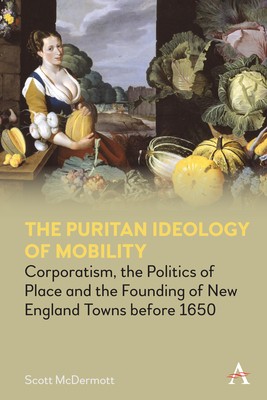
- We will send in 10–14 business days.
- Author: Scott McDermott
- Publisher: Anthem Press
- ISBN-10: 1785274724
- ISBN-13: 9781785274725
- Format: 15.2 x 22.9 x 1.6 cm, hardcover
- Language: English
- SAVE -10% with code: EXTRA
Reviews
Description
The Puritan Ideology of Mobility: Corporatism, the Politics of Place, and the Founding of New England Towns before 1650 examines the ideology that English Puritans developed to justify migration: their migration from England to New England, migrations from one town to another within New England, and, often, their repatriation to the mother country. Guided by the Protestant scholasticism of Cambridge University, Puritan leaders accepted the ancient corporatist image of society as a living, organic body politic, a model which they applied to nations, colonies, business corporations like the Massachusetts Bay Company, and towns.
But if a town, a colony, or a nation were a living body, how could Puritans justify withdrawing from one body to form a new social body, as they so often did? Drawing on the prevailing humoral theory of health, Puritans leaders believed that if a social body became "distempered" because of insufficient resources or political or religious disagreements, it might become necessary to bring about a new body politic in order to restore balance and harmony to the existing one. This theory gave rise to a robust "politics of place" in colonial New England, where one's choice of residence could make a strong political statement.
In order to facilitate the founding of new town bodies, colonial elites were endowed with unique privileges of mobility. But these entrepreneurs also needed ordinary inhabitants to make a successful migration, so that the various "members" of the new social body all benefited from the opportunities conferred through the privilege of migration. The body of a new town was articulated through the social ritual of land distribution, carried out in proportion to rank according to Aristotelian "distributive justice." The book will trace this process at work in the founding of Ipswich and its satellite towns in Massachusetts.
EXTRA 10 % discount with code: EXTRA
The promotion ends in 17d.14:35:53
The discount code is valid when purchasing from 10 €. Discounts do not stack.
- Author: Scott McDermott
- Publisher: Anthem Press
- ISBN-10: 1785274724
- ISBN-13: 9781785274725
- Format: 15.2 x 22.9 x 1.6 cm, hardcover
- Language: English English
The Puritan Ideology of Mobility: Corporatism, the Politics of Place, and the Founding of New England Towns before 1650 examines the ideology that English Puritans developed to justify migration: their migration from England to New England, migrations from one town to another within New England, and, often, their repatriation to the mother country. Guided by the Protestant scholasticism of Cambridge University, Puritan leaders accepted the ancient corporatist image of society as a living, organic body politic, a model which they applied to nations, colonies, business corporations like the Massachusetts Bay Company, and towns.
But if a town, a colony, or a nation were a living body, how could Puritans justify withdrawing from one body to form a new social body, as they so often did? Drawing on the prevailing humoral theory of health, Puritans leaders believed that if a social body became "distempered" because of insufficient resources or political or religious disagreements, it might become necessary to bring about a new body politic in order to restore balance and harmony to the existing one. This theory gave rise to a robust "politics of place" in colonial New England, where one's choice of residence could make a strong political statement.
In order to facilitate the founding of new town bodies, colonial elites were endowed with unique privileges of mobility. But these entrepreneurs also needed ordinary inhabitants to make a successful migration, so that the various "members" of the new social body all benefited from the opportunities conferred through the privilege of migration. The body of a new town was articulated through the social ritual of land distribution, carried out in proportion to rank according to Aristotelian "distributive justice." The book will trace this process at work in the founding of Ipswich and its satellite towns in Massachusetts.


Reviews